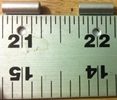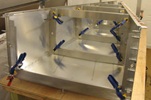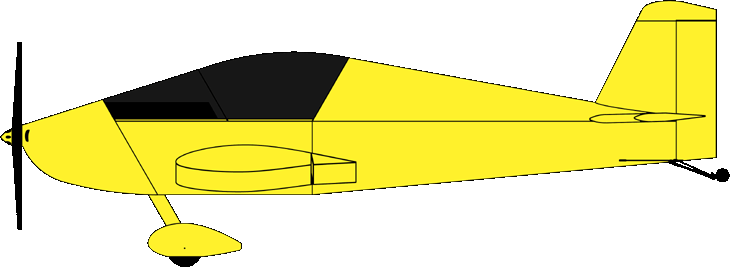


random user submitted photo
Alternator failure
7 posts
• Page 1 of 1
Alternator failure
My 20 amp alternator isn’t properly charging the battery for my Aerovee Turbo. My MGL iEFIS shows battery between 12.5-13.5 max but it doesn’t ever increase with engine running. My wiring setup follows the Sonex plans. I used a multimeter to first check output from alternator wire to VR and it shows ~14 volts(I’m going to retest this on AC setting). I then checked output from voltage regulator and it only shows ~2 volts. I have a spare voltage regulator but it showed the same output. A friend suggested running a resistance test on either of the two wires from alternator to VR and it should be ~100ohms. Does this sound correct? This seems like a faulty wire issue inside alternator. Any suggestions or has anyone else had a similar issue?
-

gregsonex - Posts: 24
- Joined: Thu Jul 06, 2023 1:04 pm
- Location: Redwood City, CA
Re: Alternator failure
Greg,
A couple of threads to read:
viewtopic.php?f=7&t=7420&p=56065
http://www.sonexbuilders.net/viewtopic.php?f=6&t=7412
There are some links in there as well.
Check the open loop AC voltage first - not connected to the VR. As Gregg said:
Is your regulator properly grounded? The body of the VR is a key ground point. I ran a wire to mine.
The John Deere regulator is awesome. Worth every penny.
Edit: you need significant RPM to actually charge the battery from the alternator/VR output. And it takes time. Like 3000 RPM, nothing you want to do on the ground for more than a quick test.
A couple of threads to read:
viewtopic.php?f=7&t=7420&p=56065
http://www.sonexbuilders.net/viewtopic.php?f=6&t=7412
There are some links in there as well.
Check the open loop AC voltage first - not connected to the VR. As Gregg said:
approx 23v to 27v AC at 3000 RPM when measuring across the alternator leads by themselves disconnected from the regulator.
Is your regulator properly grounded? The body of the VR is a key ground point. I ran a wire to mine.
The John Deere regulator is awesome. Worth every penny.
Edit: you need significant RPM to actually charge the battery from the alternator/VR output. And it takes time. Like 3000 RPM, nothing you want to do on the ground for more than a quick test.
Bryan Cotton
Poplar Grove, IL C77
Waiex 191 N191YX
Taildragger, Aerovee, acro ailerons
dual sticks with sport trainer controls
Prebuilt spars and machined angle kit
Year 2 flying and approaching 200 hours December 23
Poplar Grove, IL C77
Waiex 191 N191YX
Taildragger, Aerovee, acro ailerons
dual sticks with sport trainer controls
Prebuilt spars and machined angle kit
Year 2 flying and approaching 200 hours December 23
-

Bryan Cotton - Posts: 5489
- Joined: Mon Jul 01, 2013 9:54 pm
- Location: C77
Re: Alternator failure
gregsonex wrote:I used a multimeter to first check output from alternator wire to VR and it shows ~14 volts(I’m going to retest this on AC setting). I then checked output from voltage regulator and it only shows ~2 volts. I have a spare voltage regulator but it showed the same output. A friend suggested running a resistance test on either of the two wires from alternator to VR and it should be ~100ohms. Does this sound correct?
I agree with Bryan's advice.
I'd expect the resistance of the alternator to be much closer to around 1 ohm. It's a reasonably thick copper wire that has to deliver 20Amps at ~12 volts.
The voltage regulator doesn't work the same as you might guess. One terminal is connected directly to the battery so should measure battery voltage. The other terminal gets switched on and off--disconnected and reconnected to the negative terminal of the battery through transistors to control charging of the battery and prevent overcharging. So a value of 2v doesn't strike me as wrong, I'd expect it to be low, but I'd need an oscilloscope to really make sense of what's happening on that wire.
I don't know how much experience you have and whether this is a new problem, but it's common to not be able to run enough RPMs on the ground to keep the battery charged and the numbers you mention all seem reasonable.
- gammaxy
- Posts: 600
- Joined: Wed Sep 04, 2013 9:31 am
Re: Alternator failure
Thanks Bryan and Chris. Appreciate the links and other posts. I haven’t done my first flight yet so just trying to do some ground tests to get the engine ready—-which it ran great on initial start. It sounds like I’ll need to wait till first flight to generate enough rpms to get the alternator to charge the battery. I ran a bunch of these tests at idle. I’m pretty sure the VR is grounded correctly. Wiring and electrical is definitely an area where I have a lot to learn.
-

gregsonex - Posts: 24
- Joined: Thu Jul 06, 2023 1:04 pm
- Location: Redwood City, CA
Re: Alternator failure
We shut off the secondary at the top of the climb. About 5 minutes after I turn off the secondary I check the voltage and it is generally 14.6. The secondary takes a lot of juice and the battery needs to recharge after the start. First flight should probably be 30 minutes if things are going well. That will let you evaluate your charging system.
Bryan Cotton
Poplar Grove, IL C77
Waiex 191 N191YX
Taildragger, Aerovee, acro ailerons
dual sticks with sport trainer controls
Prebuilt spars and machined angle kit
Year 2 flying and approaching 200 hours December 23
Poplar Grove, IL C77
Waiex 191 N191YX
Taildragger, Aerovee, acro ailerons
dual sticks with sport trainer controls
Prebuilt spars and machined angle kit
Year 2 flying and approaching 200 hours December 23
-

Bryan Cotton - Posts: 5489
- Joined: Mon Jul 01, 2013 9:54 pm
- Location: C77
Re: Alternator failure
Bryan Cotton wrote:We shut off the secondary at the top of the climb. About 5 minutes after I turn off the secondary I check the voltage and it is generally 14.6. The secondary takes a lot of juice and the battery needs to recharge after the start. First flight should probably be 30 minutes if things are going well. That will let you evaluate your charging system.
sounds good
-

gregsonex - Posts: 24
- Joined: Thu Jul 06, 2023 1:04 pm
- Location: Redwood City, CA
Re: Alternator failure
btw I was surprised how much detail AC-90-89C has with regards to first, second, third flight and then 4-10hrs, 11-20 hrs, etc for phase 1. I'm combining that with a spreadsheet that Jeff Schultz has on his site which has a ton of data inputs and creates charts for the POH for my flight plan.
-

gregsonex - Posts: 24
- Joined: Thu Jul 06, 2023 1:04 pm
- Location: Redwood City, CA
7 posts
• Page 1 of 1
Who is online
Users browsing this forum: No registered users and 19 guests







